India independence to lockdown: Meet Indians named after historic events
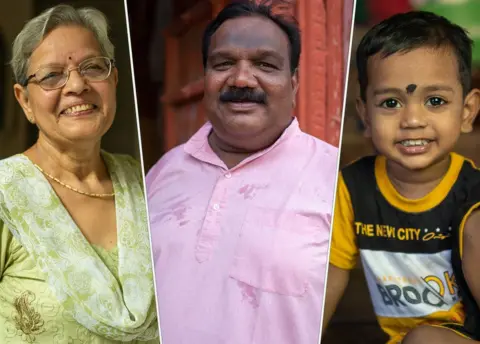 BBC
BBCHow often do you meet a person with a truly unique name?
Most Indian parents prefer to name their children after gods, sports icons, film stars or even famous cartoons. But some get inspiration from entirely different sources.
As India marks 75 years since independence, the BBC met six people across the country whose parents named them after a historical event that unfolded during their birth.

AZAD Kapoor, 75 years
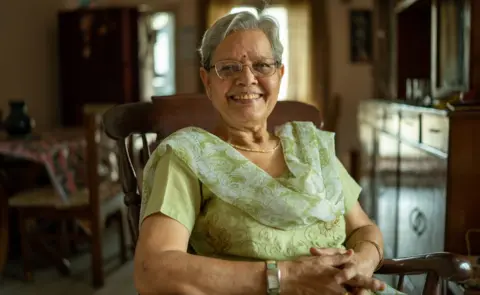 Jaltson Akkanath Chummar/BBC
Jaltson Akkanath Chummar/BBCAzad Kapoor was born on 15 August 1947 - the day India got freedom from British rule.
"When I was born my family celebrated, saying Mother India has come home and brought us freedom," she says.
Azad - which means free - was not very happy with her name as a child since it sounded like a boy's name. But as time passed, she came around to it.
"No-one ever forgets my birthday. Everyone who knows me remembers me on 15 August. My friends joke that the whole country celebrates my birthday,"she says.

EMERGENCY Yadav, 47 years
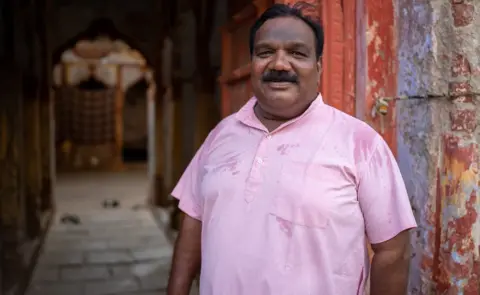 Jaltson Akkanath Chummar/BBC
Jaltson Akkanath Chummar/BBCEmergency Yadav was born on 26 June 1975, a day after a state of Emergency was declared in India.
"My father told me that he gave me this name so that people would not forget about this sad, dark period in India's history," he says.
In a radio announcement to the country, then prime minister Indira Gandhi said she was declaring a state of emergency, citing a threat to national security from "internal disturbances". Constitutional rights were suspended, press freedom was curtailed and many opposition leaders were jailed.
Emergency Yadav's father Ram Tej Yadav - who was an opposition politician - was arrested hours before his son was born. He spent 22 months in jail and met his son only after the emergency was lifted in 1977.
"If there is emergency in any country, it means that the country is regressing. I really hope that we never have to see another instance like this again,"he says.

KARGIL Prabhu, 23 years
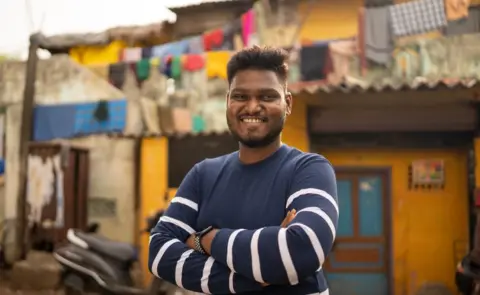 Jaltson Akkanath Chummar/BBC
Jaltson Akkanath Chummar/BBCKargil Prabhu - born during the 1999 Kargil conflict between India and Pakistan over the disputed territory of Kashmir - didn't know the significance of his name for a long time.
"Even though I was named after this conflict, I didn't know much about it until I grew up and Googled it. My father passed away when I was young so he couldn't tell me what my name meant," he says.
Kargil works as a video editor in the southern city of Chennai and has never visited the town he was named after. But it is on top of his bucket list of places to visit.
More than 500 Indian soldiers died during the conflict, which began after India retaliated against infiltration from Pakistan - though Islamabad has long denied this. The conflict lasted three months before India declared victory.
"I don't believe in war, but I think India had to defend itself during the Kargil war, and that was the right decision,"Mr Prabhu says.

TSUNAMI Roy, 17 years
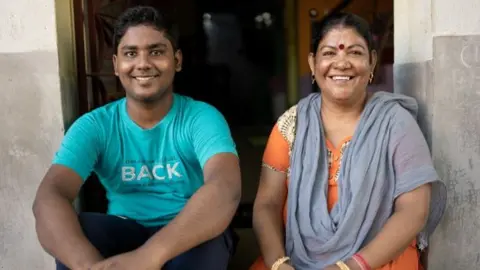 Jaltson Akkanath Chummar/BBC
Jaltson Akkanath Chummar/BBCTsunami's mother's eyes well up when she remembers the day her son was born.
Mounitha Roy was heavily pregnant when she took refuge on top of a small hill in one of the islands in the Andaman archipelago, which was struck by a devastating tsunami in 2004.
"I told my husband to escape with my elder son. I had no hope for myself and the baby in my womb. At around 11pm, I delivered my son in the dark on top of a rock, without any assistance or medication. My health never recovered after that," she says.
At school, Tsunami was mocked for being named after a disaster. But for his mother, the name means hope and survival.
"My son came as a ray of hope to all of us, in the midst of everyone mourning the deaths of their family members. My son was the only good thing that happened that day," Mrs Roy says.
More than 200,000 people, including 10,000 Indians, were killed in the 26 December tsunami, which was triggered by an underwater earthquake in the Indian Ocean.

KHAZANCHI Nath, 5 years
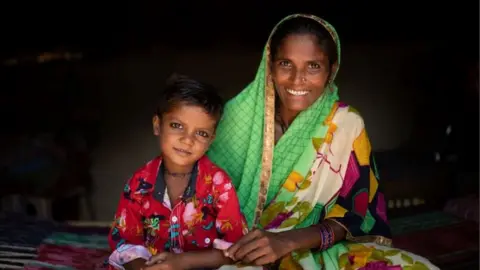 Jaltson Akkanath Chummar/BBC
Jaltson Akkanath Chummar/BBCKhazanchi was born in a branch of Punjab National Bank in the northern state of Uttar Pradesh, a few weeks after Prime Minister Narendra Modi made a surprise announcement withdrawing high-value banknotes from circulation.
Khazanchi's mother, Sarvesha Devi, went into labour while standing in line to withdraw some money after the move - called demonetisation or note ban in India - triggered massive cash shortages.
"Since he was born in a bank, everyone said he should be named Khazanchi (cashier)," she says.
Mr Modi gave only four hours' notice on 8 November 2016 while declaring that 1,000 and 500 rupee notes would no longer be valid, wiping out more than 85% of Indian currency. Authorities said it was done to target bribery, tax evasion and terror financing, but experts said it severely impacted common people and small businesses across the country.
But to Khazanchi's family, his name brought luck. The main opposition leader in Uttar Pradesh made Khazanchi one of the stars in his campaign ahead of state elections held earlier this year.
"He's brought us money and wealth, everyone is helping us. I have a proper house and enough cash because of his name," says Sarvesha Devi.

LOCKDOWN Kakkandi, 2 years
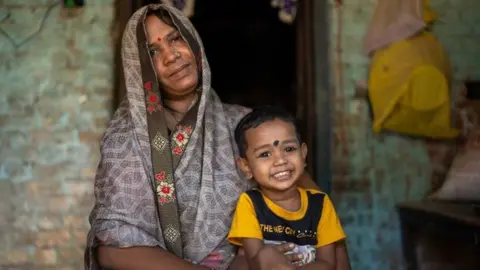 Jaltson Akkanath Chummar/BBC
Jaltson Akkanath Chummar/BBCLockdown Kakkandi - born one week after a Covid-led shutdown was announced in India in 2020 - is a celebrity in the small village of Khukhundu in Uttar Pradesh.
"My son was born at the peak of the lockdown. It was very hard to find a vehicle to take my wife for delivery. Many doctors were even unwilling to attend to patients. Thankfully my son was born without any complications," says Lockdown's father Pawan Kumar.
In Lockdown's village and surrounding areas, everybody knows his address and many visit his house to meet him.
"People may make fun of him for some time, but everyone will remember him too. I want his name to be a reminder of what people were going through at that time," says father Pawan Kumar.
The nationwide lockdown, announced by Mr Modi on 24 March 2020, came as a shock to many Indians as they were given just a few hours' notice. The weeks after it were marked by a shortage of necessities and massive job losses, especially in the informal sector.

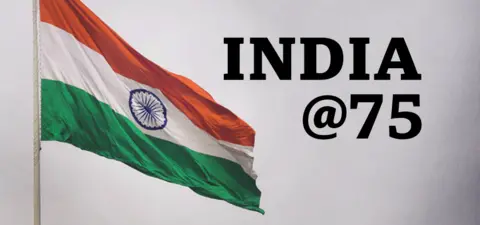
India, the world's largest democracy, is celebrating 75 years of independence from British rule. This is the second story in the BBC's special series on this milestone.
Read more from the series here:

